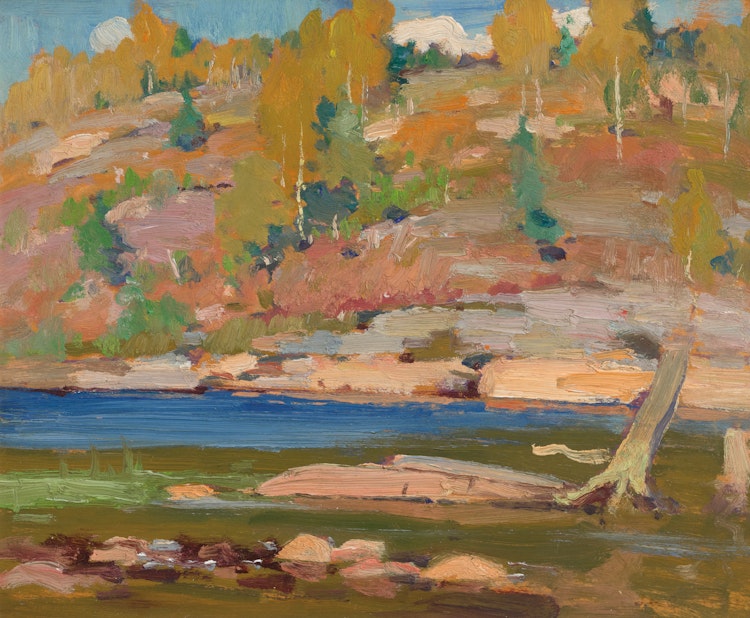Early Autumn, Canoe Lake, circa 1922 by John William Beatty

John W. Beatty
Early Autumn, Canoe Lake, circa 1922
oil on board
titled on a gallery label and inscribed "Early Autumn, Canoe Lake" on the reverse
8.5 x 10.5 in ( 21.6 x 26.7 cm )
Auction Estimate: $7,000.00 - $9,000.00
Price Realized $7,800.00
Sale date: May 28th 2025
Canadian Fine Arts, Toronto
Private Collection, Toronto
Heffel, auction, Toronto, 29 November 2018, lot 302
Private Collection
Roberts Gallery, Toronto
Private Collection, Memphis
Dorothy Mary Farr, "J. W. Beatty, 1869-1941", Kingston, 1981, pages 10, 40
Share this item with your friends
John William Beatty
(1869 - 1941) OSA RCA
John William Beatty’s early art training came from his father, a sign and house painter who passed along his knowledge of graphics. He left school early and found work at a local engraving firm. While still a teenager he joined the 10th Grenadiers as a bugler and served in this capacity in the Northwest Rebellion. Following his military service, he married and joined Toronto's newly formed Fire Department. He had not lost sight of his childhood dream to become an artist, and used his spare time at the fire hall to paint portraits of his fellow firemen and to do still life paintings. In his spare time he studied under William Cruikshank, F. M. Bell-Smith and G. A. Reid. He also sought out formal training from professional artists in the after hours. When he had saved enough money, he and his wife sailed for Paris where he planned to study at the Academie Julian.
At the Academie, he studied under Jean Paul Laurens and Benjamin Constant and earned several awards for his figure drawing. After returning to Toronto in 1901, he opened a studio and began to teach at the Ontario School of Art and Design. He attended classes at the Mahlstick Club and became a founding member of the Graphic Arts Club. He then returned to Europe in 1906-9 where he continued studies at the Academie Julian and the Colarossi Academy. After further studies in London, and travelled around Europe to Holland, Belgium, Italy and Spain. The Barbizon School, based on the atmospheric paintings of John Constable, was a powerful influence all around Europe, and had its affect on Beatty as well.
He returned to Toronto in 1909 and continued painting and teaching classes. His early landscapes were grey and sombre, characteristic of French and Dutch painting of the traditional school. He was among the innovative Toronto artists who travelled to Northern Ontario to sketch via canoe. Starting in 1912 he went on regular sketching trips with Tom Thomson, J.E.H. MacDonald and A.Y. Jackson. He one of the first painters to be offered a studio in the famed Studio Building, in Toronto’s Rosedale Valley Ravine. He and Jackson were both awarded a commission by the Canadian Northern Railway to paint in and around the construction camps as the railway was laid through the rocky mountains.
After 1910 he went north to sketch first alone and then with Tom Thompson. His colours became brighter probably through the association with the artists who were to become members of the Group of Seven and also the association with Tom Thomson. Beatty carved the stonework for the memorial cairn erected to his friend, Tom Thomson, at Canoe Lake. He was appointed an official war artist this same year and went overseas. A teacher at the Ontario Collage of Art in 1913 he returned there after the ware where he remained until his death. He was a member of the Royal Canadian Academy, the Ontario Society of Artists, and served as president of the Arts and Letters Club. His works are in the National Gallery of Canada, the Art Gallery of Ontario, the McMichael Canadian Collection, Hart House at the University of Toronto, Queen’s University Art Centre, the Canadian War Museum and elsewhere.
Source: "A Dictionary of Canadian Artists, Volume I: A-F", compiled by Colin S. MacDonald, Canadian Paperbacks Publishing Ltd, Ottawa, 1977

